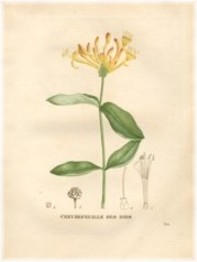Halcyon Honeysuckle
By Audrey Stallsmith

Oliver whose days had been spent among squalid crowds, and in the midst of noise and brawling, seemed to enter on a new existence there. The rose and honeysuckle clung to the cottage walls. . .The little room in which he was accustomed to sit, when busy at his books, was. . .quite a cottage-room, with a lattice-window: around which were clusters of jessamine and honeysuckle, that crept over the casement, and filled the place with their delicious perfume.
Oliver Twist--Charles Dickens
As with lilac, any mention of honeysuckle tends to rouse nostalgia in the hearer--even if it is for a place he's never actually seen! That country cottage so idealized by authors like Dickens where roses and honeysuckle twine around the door of a perpetual summer.
Actually, that vine was probably originally planted by the entrance to repel witches! And, though it's June and rose season in the country here at the moment, it is--I'm afraid--not all that peaceful. We gardeners are, on the contrary, engaged in a constant struggle with rose slugs, aphids, beetles, and black spot. And I don't have any honeysuckle at the moment, since I've heard that a few types such as japonica can be invasive thugs.
But I do plan to get some one of these days. We gardeners aren't immune to that longing after the ideal either! We all lust for the year when we are finally going to "get it right" and our cottages will bloom like the ones in the pictures.
That craving after the beautiful, which is almost pain, is the definition of hope and what keeps all of us going. Some of us contend it is our longing for our lost Eden, or as C. S. Lewis put it "that earlier music that men are born remembering."
In "Souvenir," Edwin Arlington Robinson recalls "A vanished house that for an hour I knew/ By some forgotten chance when I was young/ Had once a glimmering window overhung/ With honeysuckle wet with evening dew." And, in "To Earthward," Robert Frost writes "I had the swirl and ache/ From sprays of honeysuckle/ That when they're gathered shake/ Dew on the knuckle."
The plant's common name probably sprung from the generations of children who have drunk nectar from the "tubes" contained within its flowers. It was dubbed lonicera in honor of a German botanist named Adam Lonicer.
Originally known as woodbind or woodbine, honeysuckle actually comes in bushes as well as vines. Lonicera periclymenum is the wild honeysuckle of England and caprifolium ("goat's leaf") of Italy. Tatarica is a bush type said to be especially attractive to felines, since it contains the same active ingredient as catnip.
Honeysuckle has what Louise Beebe Wilder calls in The Fragrant Path, "a fine quick scent; it is never over heavy or cloying and is one of those rare perfumes of which one can scarcely get enough."
She also quotes William Bullein, who wrote in 1562, "Oh how swete and pleasant is Woodbinde, in woodes or arbours, after a tender soft rayne, and how friendly doe this herbe. . .imbrace the bodies, armes and branches of trees with his long winding Stalkes and tender leaves, opening or spreading forthe his swete Lillis, like ladies' fingers, emog the thornes or bushes."
In the same century John Gerard noted that honeysuckle was "neither cold nor binding, but hot and attenuating or making thin." He recommended "the floures steeped in oile, and set in the Sun. . .to annoint the body that is benummed and growne very cold."
That warmth and its clinging habit is probably why honeysuckle stands for "affection" and "devotion" in the Language of Flowers, as well as "gaiety" and "generosity." Its flowers have also been used to treat asthma and its leaves are reportedly diuretic, expectorant, and laxative. It's best to avoid the berries, however, since most of them are at least mildly toxic.
And do be careful which type of honeysuckle you buy. I'm sure you don't want the vine literally smothering your cottage, after all!
No, what we need is more that hint of heaven described by Lucy Maud Montgomery in "Twilight in the Garden" when "The west wind blowing o'er branch and flower/ Out of the wold,/ Steals through the honeysuckle bower/ And bears away on its airy wings/ Odors that breathe of paradise."
Plant plate is from Le Flore et la Pomone Francaises, courtesy of the Missouri Botanical Garden Library.








